Art & Culture
A Feast Across Centuries: Korean Flavors Shine at Hampton Court
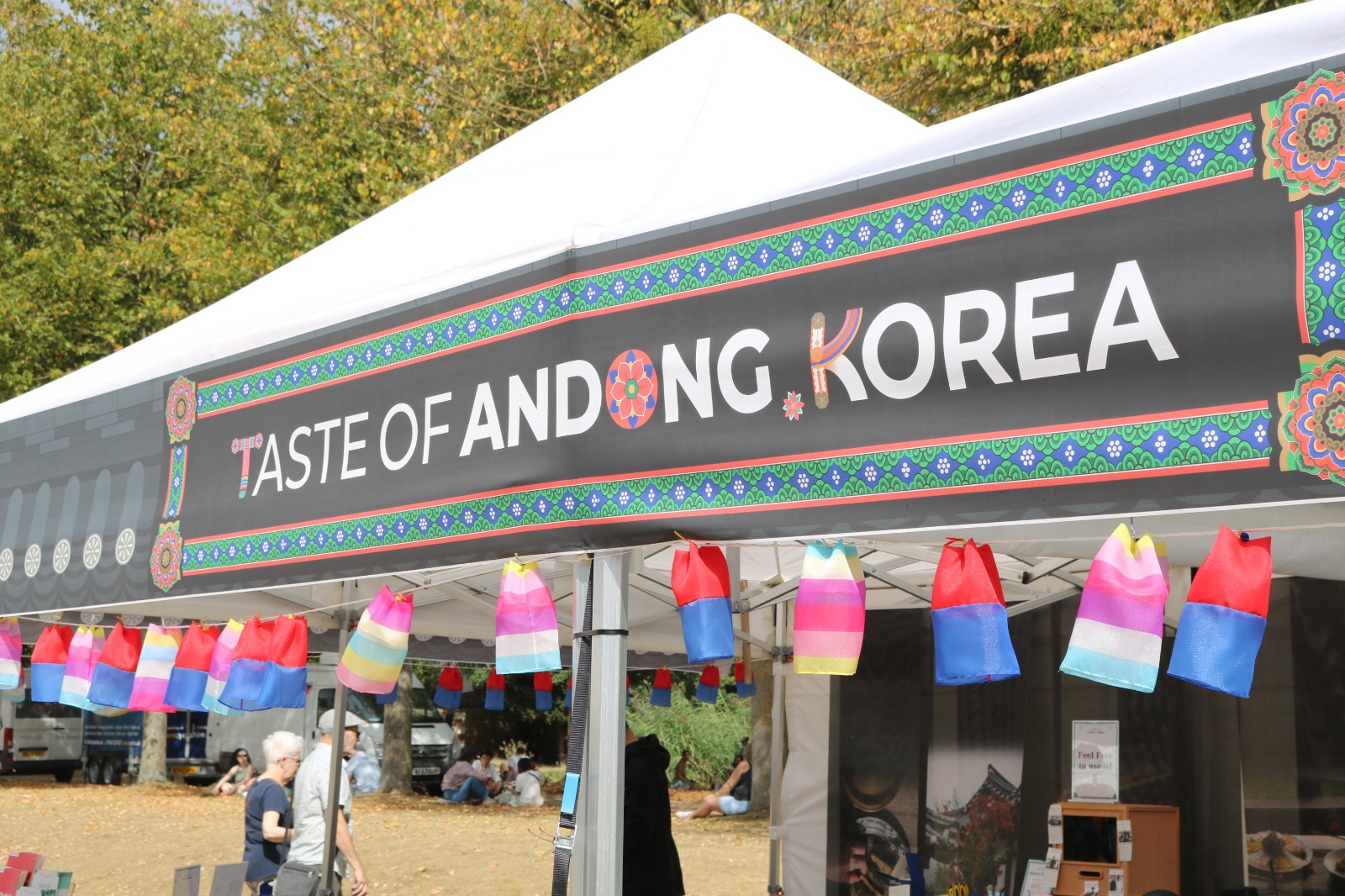
By Nadeem Ahmad Mirza & MD. Moon Hyungsuk
London, a vibrant multicultural mosaic, weaves a spell of romance and discovery, where the scents of sizzling street food—spiced curries, tangy jerk chicken, and delicate dim sum—mingle with the evening air through bustling markets. As dusk settles, the Thames reflects a golden glow, its ancient waters witnessing couples strolling hand-in-hand, whispering vows as music drifts through vibrant squares. This city, pulsating with global cuisine, fragrant flower markets, spontaneous dances, and celebrations of art, invites all to fall in love—not just with a person, but with its boundless, beating heart. Over the August Bank Holiday weekend in 2025, the Hampton Court Palace Food Festival transformed Henry VIII’s historic residence into a global gastronomic stage, with Korean cuisine, particularly Andong’s jongbu cuisine, emerging as the undeniable star.
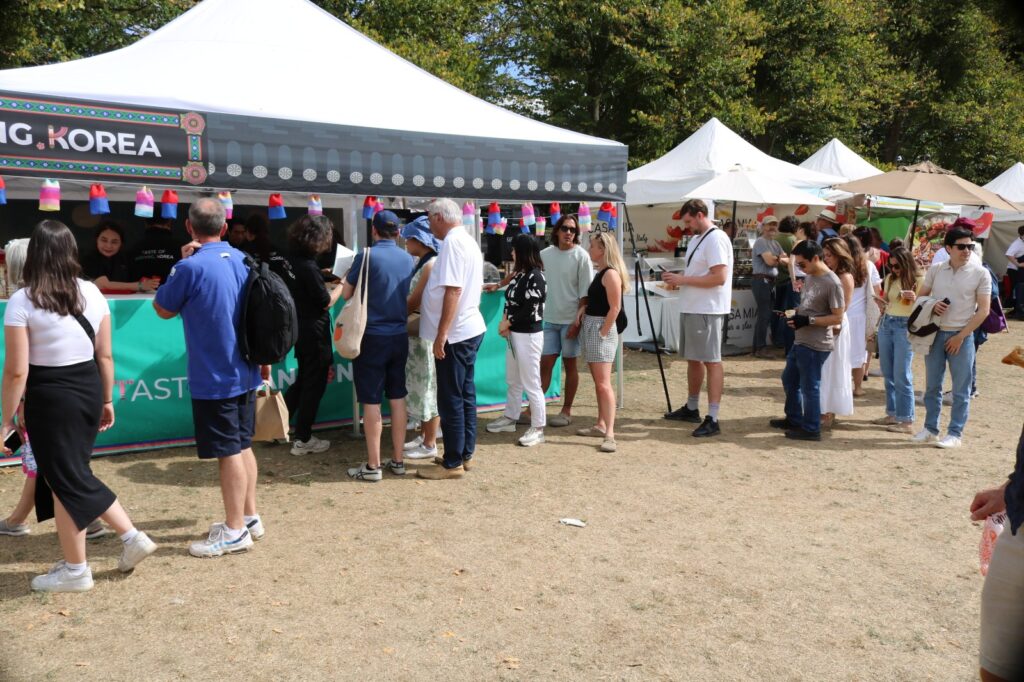
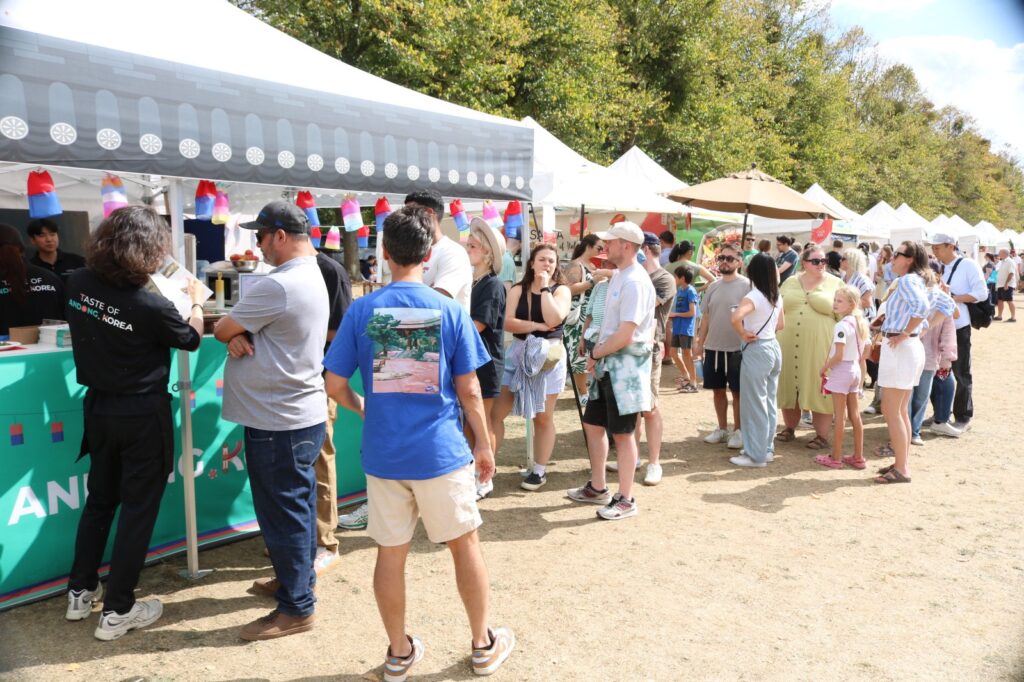
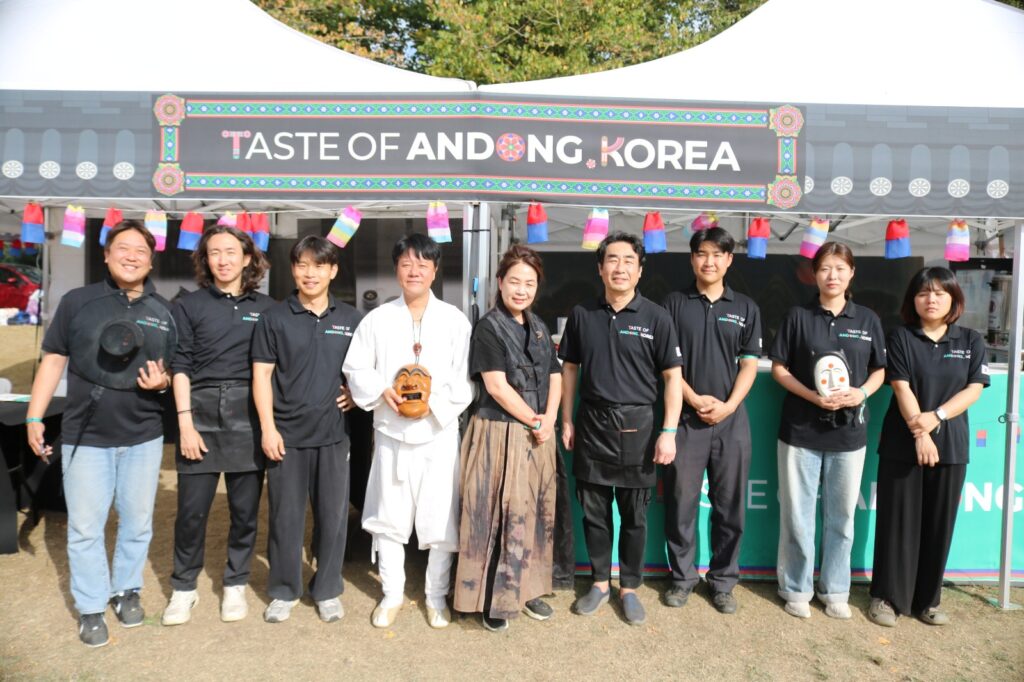
Set against the majestic red-brick backdrop of Hampton Court Palace, the annual Food Festival drew thousands from across the UK and beyond, eager to savor a dazzling array of international delicacies. From Lebanese koftas to Caribbean patties, over 150 exhibitors showcased artisanal foods, wines, and street-food innovations. Yet, this year, a vibrant tented kitchen adorned with colorful Korean banners and the South Korean flag stole the spotlight, marking a historic first: the participation of Andong, Korea’s Confucian heartland, represented by the Korea Foundation for Cultures & Ethics, introducing the centuries-old tradition of jongbu cuisine. The festival buzzed with energy under bright sunshine and a gentle breeze, as locals, international residents, and tourists flocked to the Korean stall. The air was thick with the irresistible aromas of gochujang, sesame oil, and garlic, drawing crowds to sample fiery tteokbokki (chewy rice cakes in sweet-spicy sauce), sizzling bulgogi (caramelized beef), tangy kimchi, and crisp pajeon pancakes. The sound of sizzling hot plates and upbeat K-pop rhythms created an electric atmosphere, blending seamlessly with the palace’s historic grandeur.
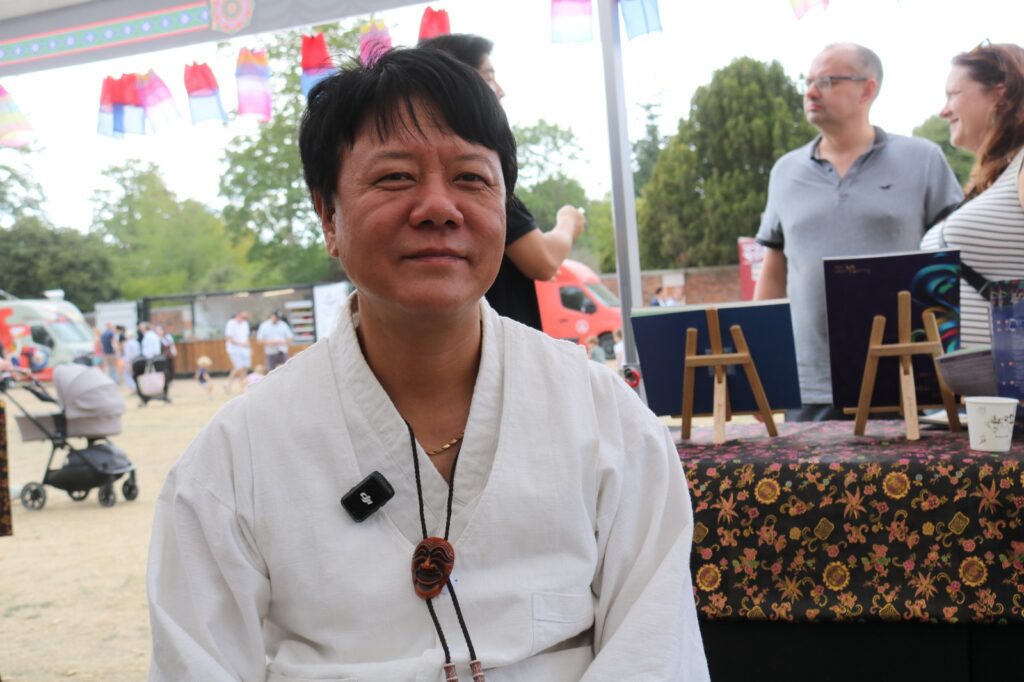
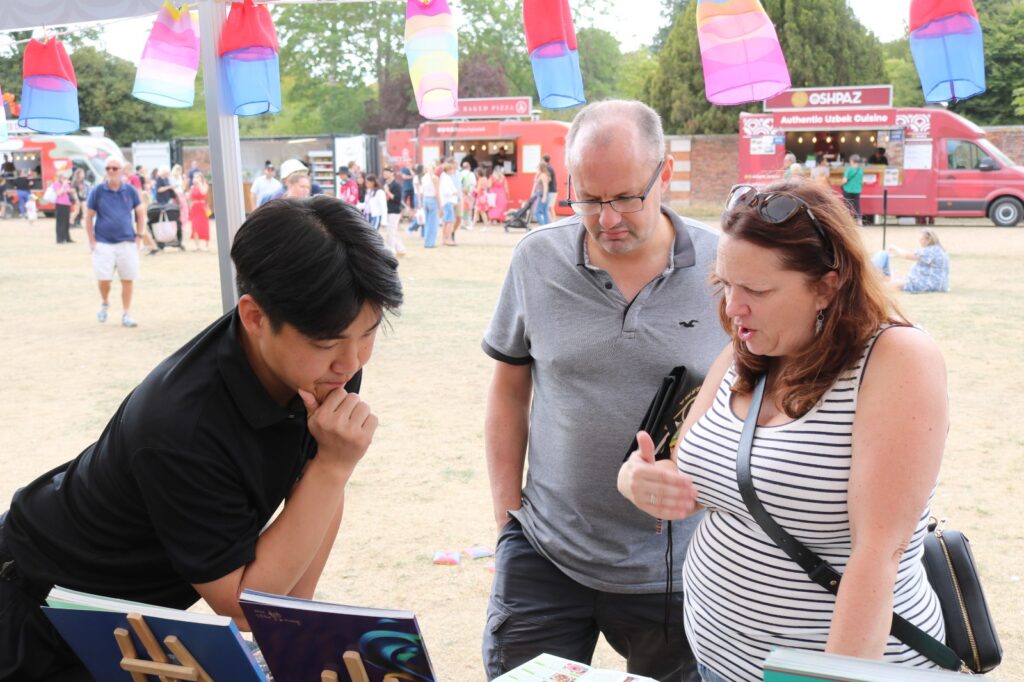
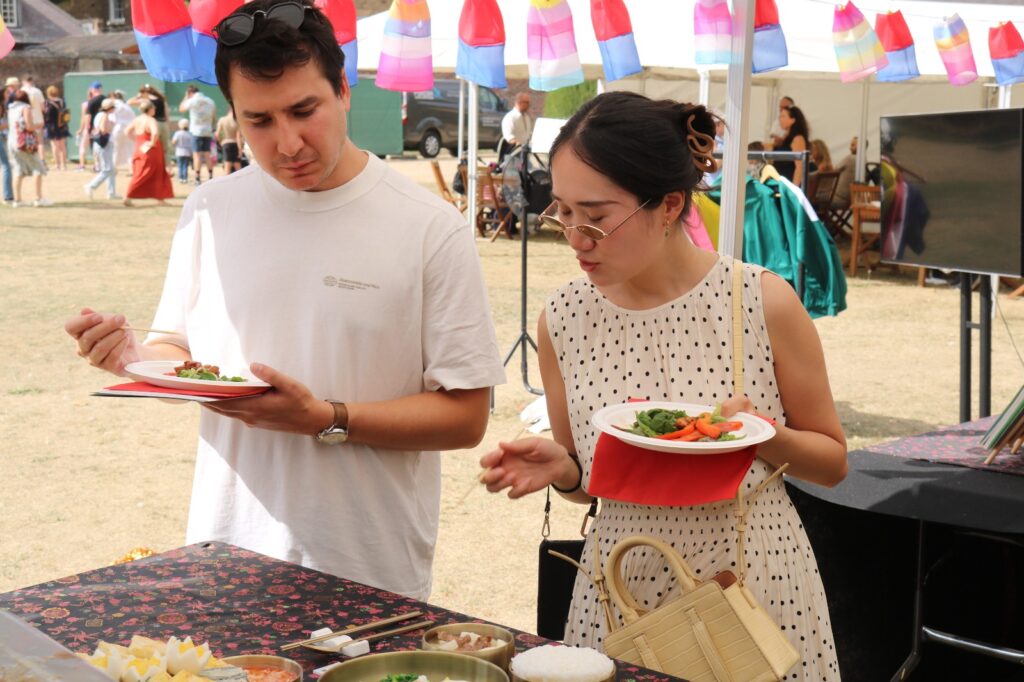
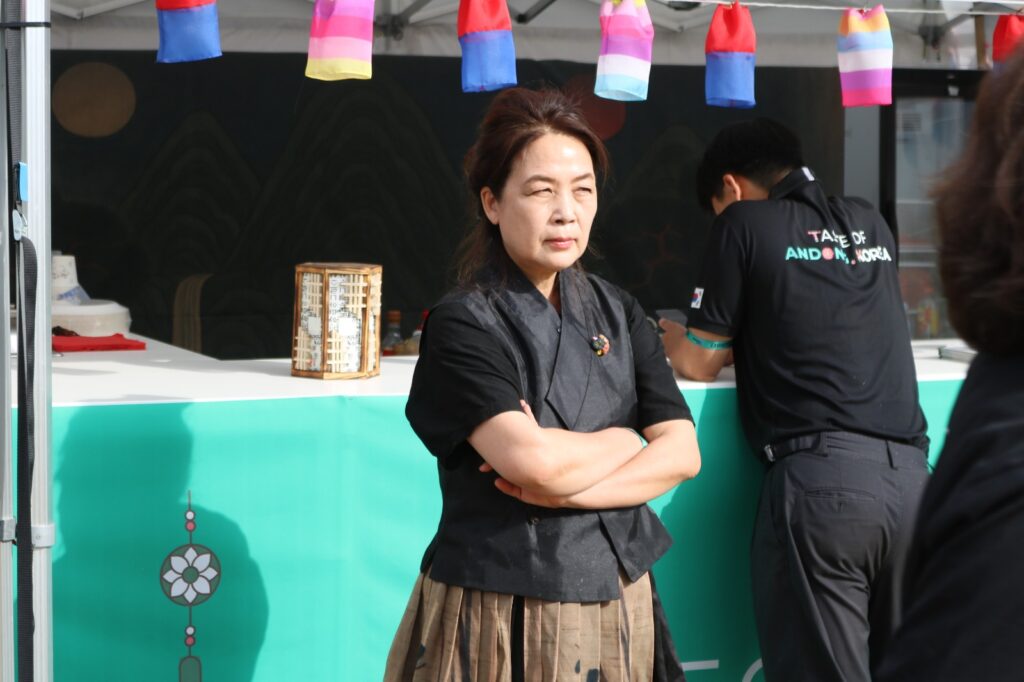
To understand the significance of this showcase, one must look to Andong, nestled in Korea’s Gyeongsangbuk-do province, long regarded as the spiritual and intellectual cradle of Confucianism. Its UNESCO-recognized heritage sites—Hahoe Folk Village, Byeongsan Seowon, and Dosan Seowon—reflect its global cultural value. Andong’s culinary traditions are deeply tied to Confucian rituals of respect, hospitality, and harmony, with dishes like heotjesabap (ceremonial bibimbap), Andong jjimdak (braised chicken with noodles), and traditional soju embodying a balance between sustenance and symbolism. The jongbu table, traditionally stewarded by the head housewife of Confucian lineages, represents the ethical and cultural responsibilities of household leadership—a concept resonant with both family life and social cohesion.
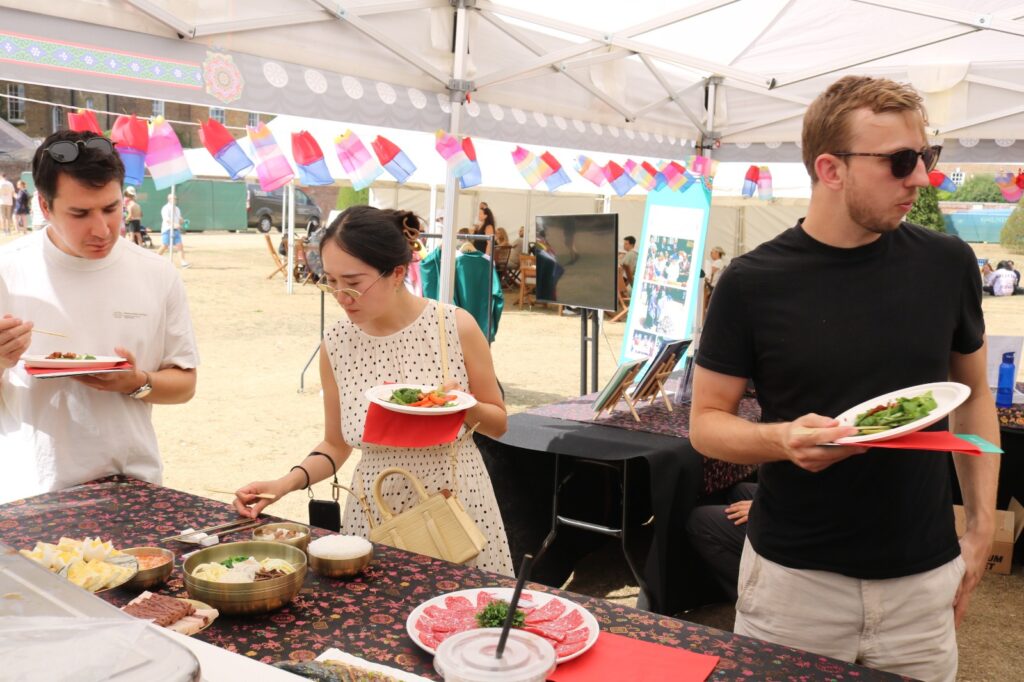
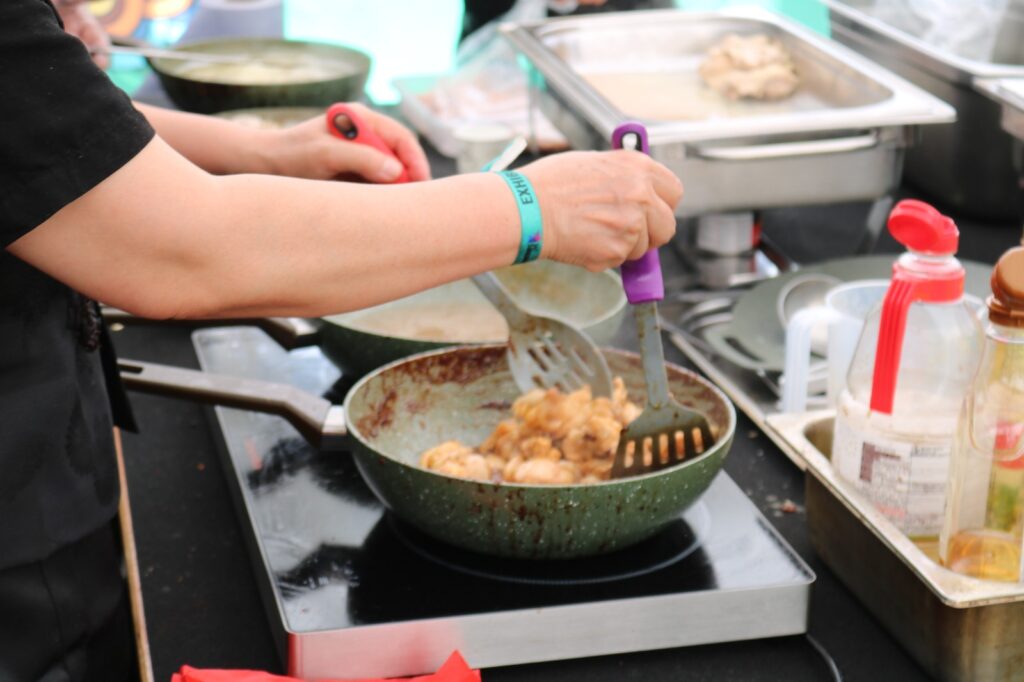
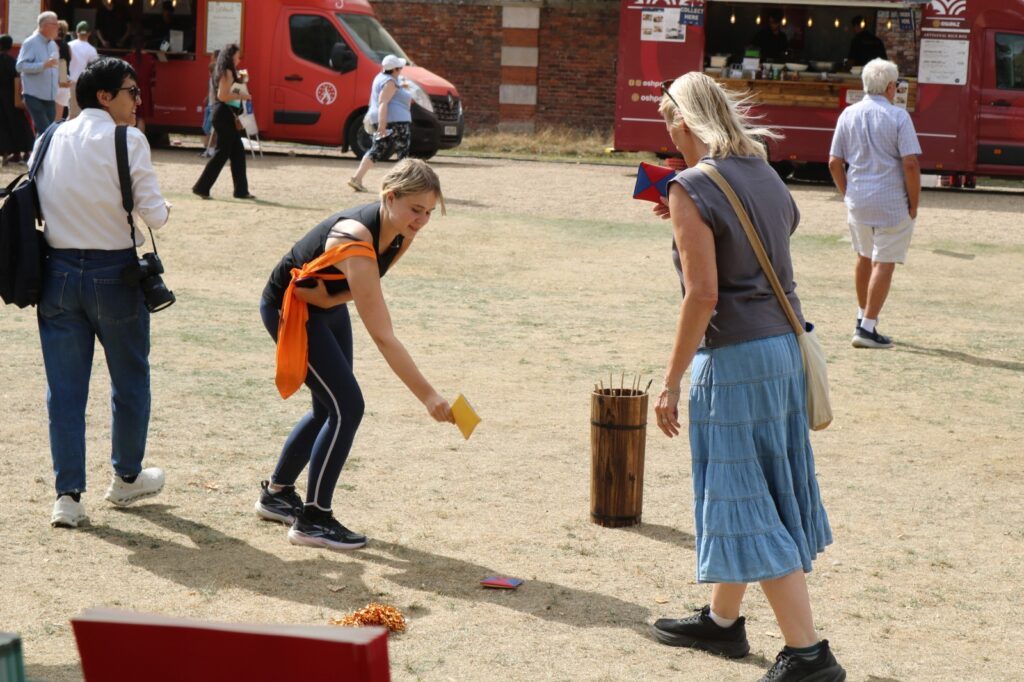
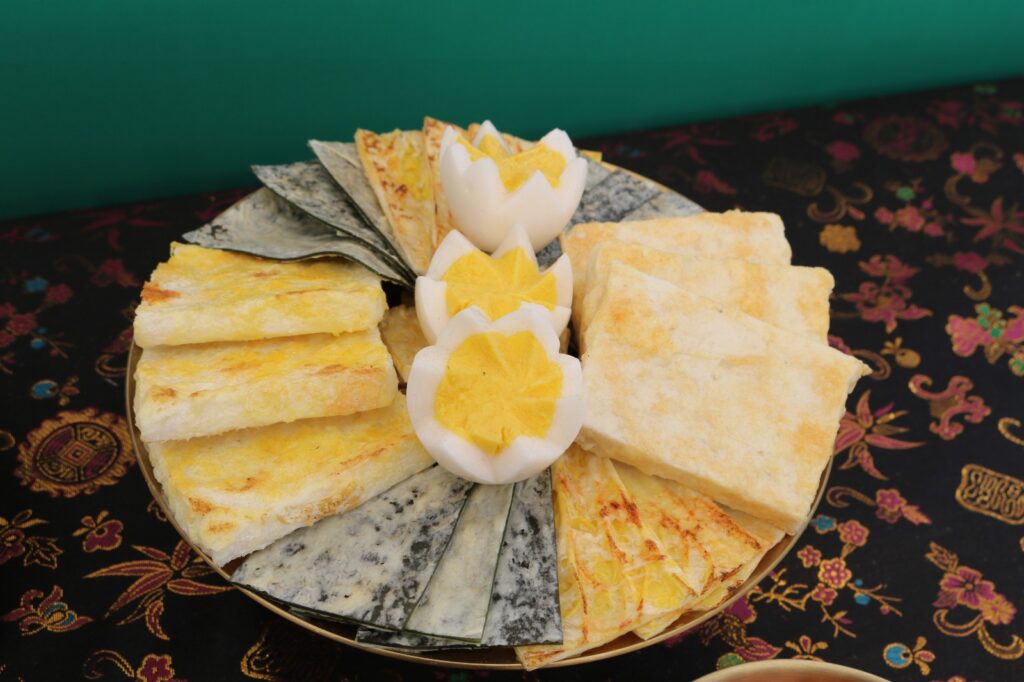
At the festival, the Andong delegation, led by Mrs. Kim Do-eun, the 15th head housewife of the Gwangsan Kim clan, and her husband, director of the Suun Japbang Culinary Research Institute, brought this heritage to life. Their showcase was anchored in jongbu cuisine, rooted in the Suun Japbang, a 16th-17th century manuscript by Confucian scholars Kim Yu (1491–1555) and Kim Ryeong (1577–1641). Written in classical Chinese, this text preserves 114 recipes—ranging from liquors, vinegars, fermented vegetables, and soy-based condiments to soups, stews, tofu, desserts, and medicinal broths. The centerpiece was yukjjim, a delicately braised beef dish, which captivated audiences not just with its flavors but with its centuries-old culinary philosophy. The Andong team, having devoted over a decade to reviving these recipes with modern finesse, presented food as a vessel of cultural diplomacy, bridging past and present.
The Korean stall was a cultural phenomenon, embodying London’s multicultural soul. Festival-goers from diverse backgrounds shared their enthusiasm, highlighting the universal appeal of Korean flavors, with Andong’s jongbu cuisine adding a profound historical depth. Sarah and Mark from Wimbledon, UK, remarked, “We saw Korean cuisine on a Netflix show and had to try it. It’s got an incredible kick, but so moreish! We’re definitely making this at home.” An Italian family noted, “We came for the palace but fell in love with Korean fried chicken. The sauce—spicy, sweet, garlicky—is perfect. We’re taking sauces home to Italy!” Anuj, a Delhi-born Londoner, observed, “London’s palate has evolved—first Italian, then Thai, now Korean. The fermented depth of Andong jjimdak is bold and healthy. I’ve already eaten.” A French couple added, “The balance in bibimbap is exquisite—rice, vegetables, egg, and gochujang. It’s a complete meal we could eat daily. We’ll find a recipe online.”
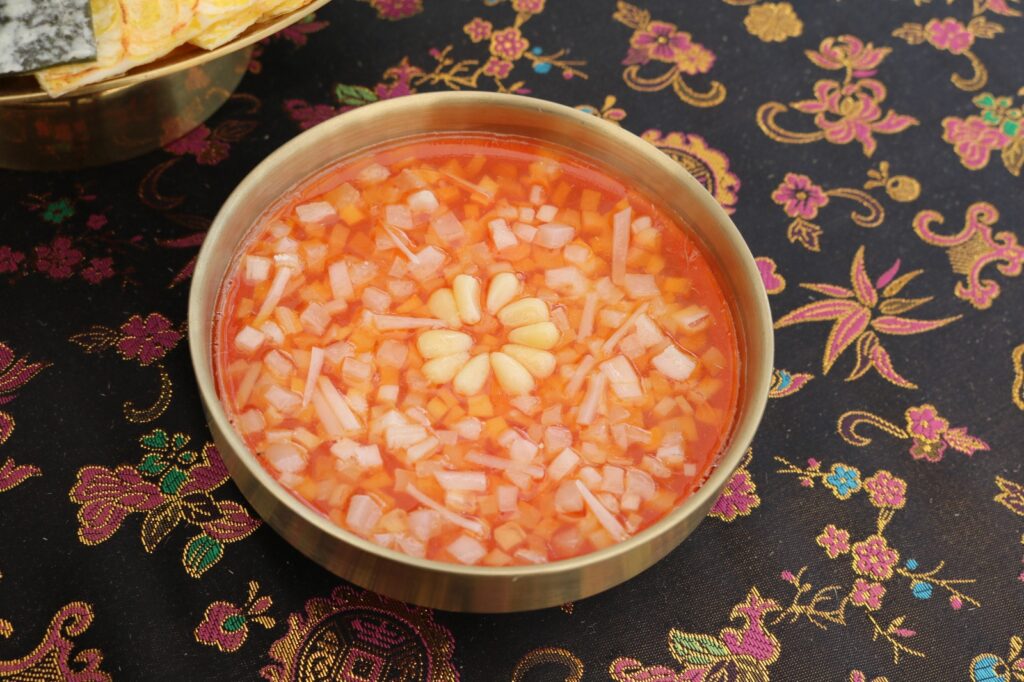
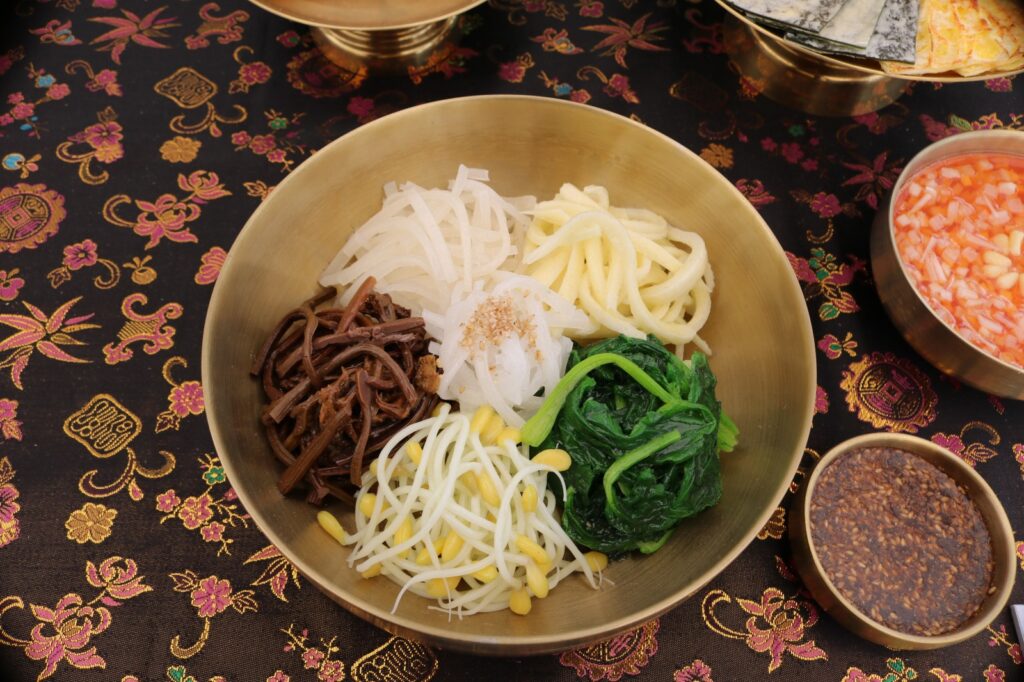
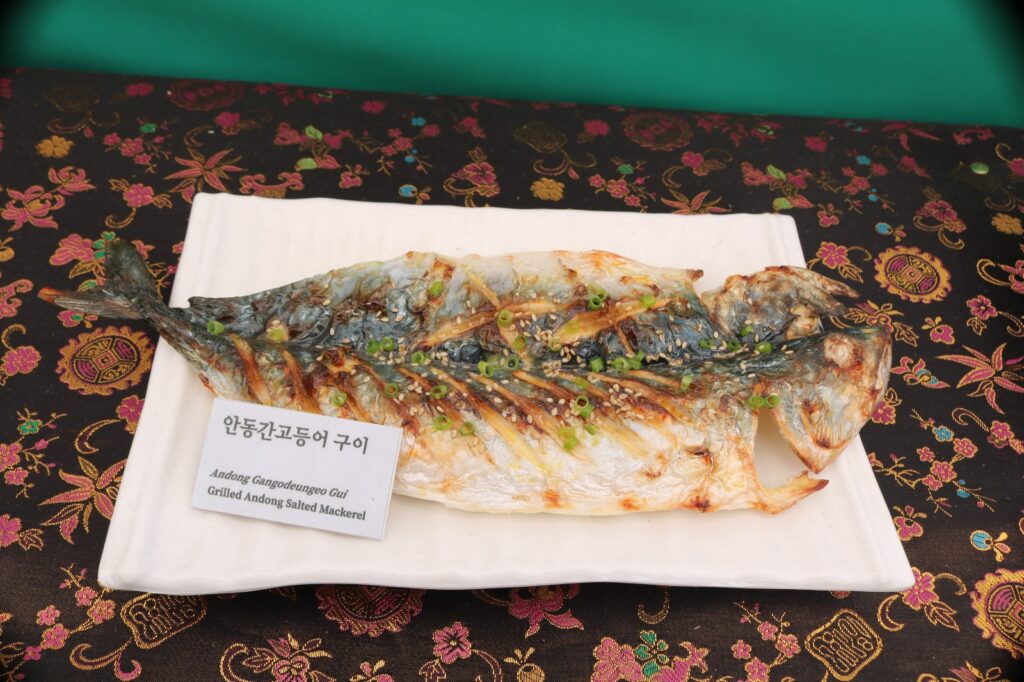
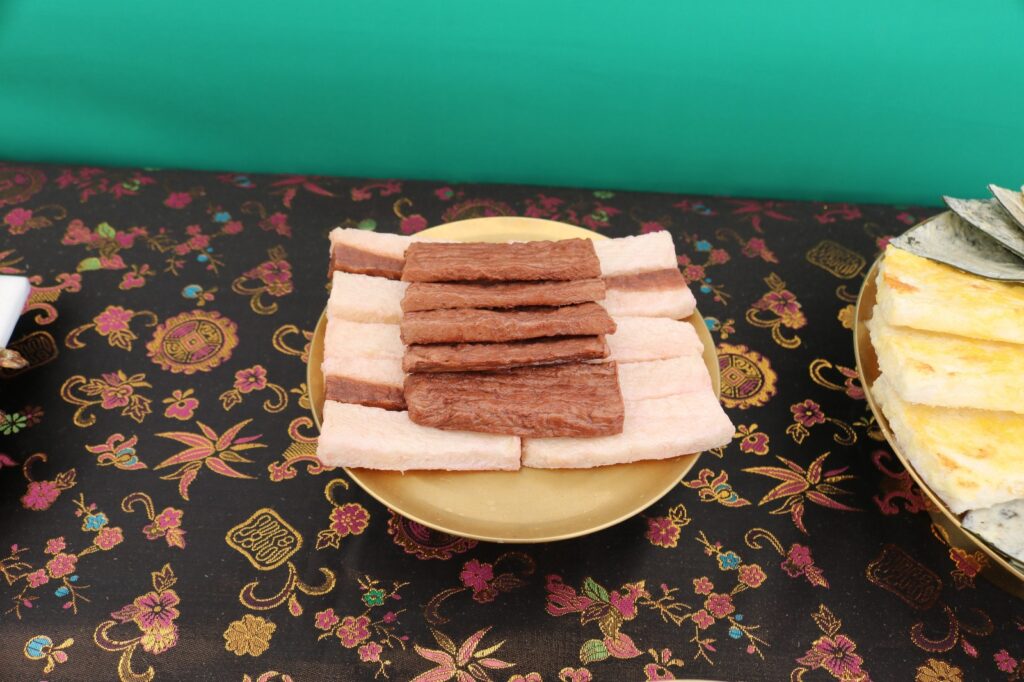
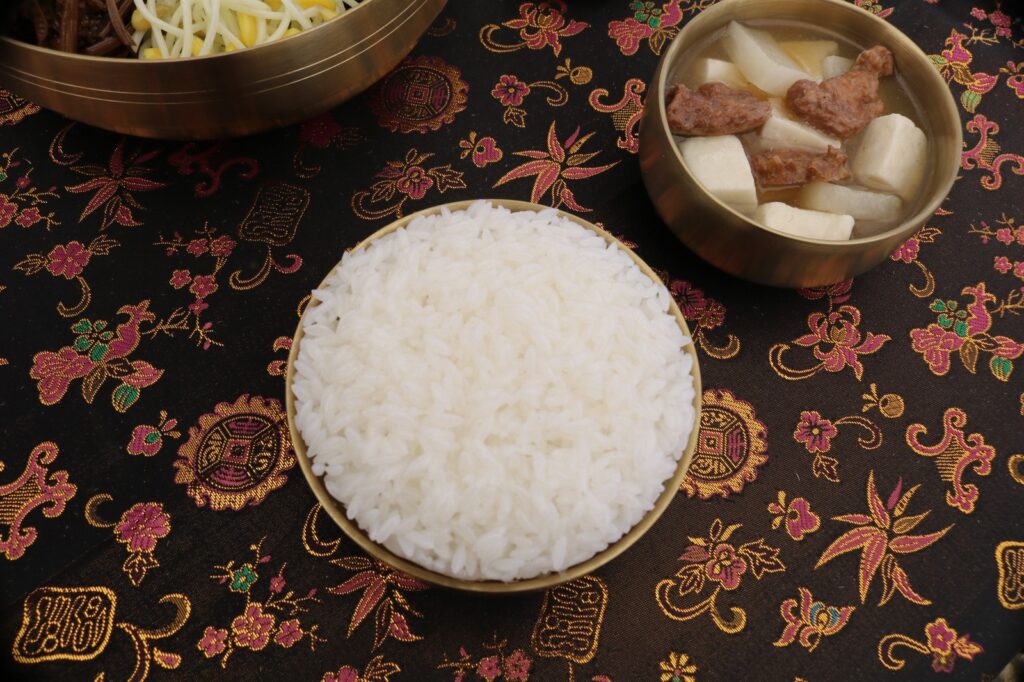
Beyond the food, the K-Food Fair offered a taste of Korean culture—from Squid Game-inspired challenges to traditional fermented foods like jang and kimchi. Visitors didn’t just eat—they immersed themselves, with Andong’s jongbu cuisine sparking curiosity about Korea’s heritage. The sentiment was clear: Korean cuisine has transcended its trendy status to become a beloved staple in London’s culinary landscape, with Andong’s contributions elevating it to a cultural narrative. The Andong delegation’s debut at Hampton Court was a profound cultural exchange, juxtaposing Suun Japbang’s Confucian recipes with the grandeur of Tudor banquets once held in the same palace. This meeting of two culinary lineages—Korean and British—united by the human impulse to gather and share, resonated deeply with visitors. The festival became a stage where food told a story, with Andong’s jongbu cuisine inviting attendees into a centuries-spanning narrative of respect, balance, and continuity. For many, tasting Andong’s yukjjim opened a gateway to explore the city’s landscapes, traditional markets, museums, and living heritage.
The Hampton Court Palace Food Festival was more than a marketplace—it was a narrative of global connection. For the Korea Foundation for Cultures & Ethics in Andong, this historic participation marked a step toward globalizing jongbu cuisine, ensuring its values resonate beyond Korea’s borders. The event underscored Korean food’s place in London’s diverse culinary tapestry, with festival-goers eager to recreate dishes like tteokbokki, bulgogi, and Andong’s yukjjim at home and explore Andong’s cultural heritage. As the festival closed, one truth was evident: Korean cuisine, enriched by Andong’s jongbu cuisine, has found a warm, enthusiastic home in London. From the royal gardens of Hampton Court to the scholarly courtyards of Andong, this culinary journey has opened a gateway for greater exchange between Britain and Korea. For those inspired by the flavors of Andong, the invitation is clear: to truly taste this heritage, one must visit Andong—and London’s love affair with Korean cuisine is only just beginning.
Art & Culture
‘There’s no other poem like it’: Why this Robert Burns classic is a masterpiece

Tam O’Shanter is a rip-roaring tale of witches and alcohol, but it has hidden depths. On Burns Night this Sunday – and 235 years after the poem was published in 1791 – Scots everywhere may well be treated to a masterwork with a unique, universal appeal.
If you’re Scottish, or if you wish you were, then this Sunday is a red-letter day. Scotland’s greatest poet, Robert Burns, was born on 25 January 1759, and Burns Suppers are now held every year, all over the world, to mark his birthday. The guests drink whisky (not “whiskey”, please – that’s the Irish and US spelling), they eat haggis, tatties and neeps (don’t ask), and they hear some of the bard’s many ballads and poems. Ae Fond Kiss, To A Mouse and Auld Lang Syne are usually on the bill. And somebody may well recite Tam O’Shanter, a rip-roaring yarn about witchcraft and heavy drinking that was first published 235 years ago in 1791. It’s a poem that has even more to it than most Burns Supper regulars might realise.
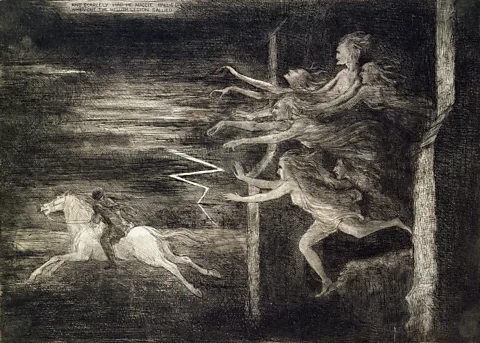
“Tam O’Shanter is Burns’s masterpiece, it really is,” says Pauline Mackay, professor of Robert Burns studies and cultural heritage at the University of Glasgow. “It’s one of his most popular works, so when you say it’s your favourite Burns poem, people say, ‘Urgh, that’s so obvious’. But actually, I’ve been studying it for many, many years, and it’s so multifaceted. Burns brought all of his considerable talents to bear on capturing what inspires him, what motivates him, and his own perception of humanity and human nature.”
And that’s not all. Robert Irvine, the editor of Burns: Selected Poems and Songs, notes that there is a darkness to the poem that goes beyond its spine-tingling descriptions of the devil and his minions. “There’s some weird stuff going on there,” he says.
Most of the revellers are ‘rigwoodie hags’, but one witch, Nannie, is young, attractive and scantily clad
The poem tells the mock-heroic tale of Tam O’Shanter, a farmer who spends as much time drinking as he does working. At the end of one market day in Ayr, he retires to the pub with his “ancient, trusty, drouthy crony” Souter Johnnie (ie, Johnnie the shoemaker), never mind that his wife Kate is waiting at home. It’s only after hours of boozing and flirting with the landlady that Tam finally sets off on his horse, Maggie. But it’s a dark and stormy night, so he has to hold on to his hat, and sing songs to keep up his spirits. “Whiles holding fast his gude blue bonnet; / Whiles crooning o’er some auld Scots sonnet.” This reference to a “blue bonnet”, incidentally, is why beret-like flat hats with pom-poms are called Tam O’Shanters.
When he approaches Alloway’s Auld Kirk, Tam notices that a diabolical party is underway inside: witches and warlocks are dancing, and the devil himself, Auld Nick, is playing the bagpipes. Most of the revellers are “rigwoodie hags”, but one witch, Nannie, is so young, attractive and scantily clad that Tam yells out the only words he speaks in the poem: “Weel done, Cutty-sark!” This cat call would later lend its name to the Cutty Sark, a 19th-Century clipper ship that can be visited in Greenwich, London. Roughly translated, it means: “Well done, Short Dress!”
Nannie and her cohorts aren’t pleased to hear it: Tam has to flee on horseback with a crowd of screeching witches in hot pursuit, “Wi’ mony an eldritch skriech and hollo”. Luckily for him, witches can’t cross running water, and the River Doon is nearby. Tam manages to race over the bridge to safety, but Maggie the horse isn’t quite so fortunate. Nannie grabs hold of her tail just as she steps on to the Brig O’ Doon, and – spoiler alert – she is left with “scarce a stump”.
Rude jokes and chilling imagery
Carruthers calls it a “fairly hackneyed ghost story plot”, but the way Burns tells his story means that “there’s no other poem like it in Scottish literature”. Tam O’Shanter is “incredibly rich, so visual, so carefully crafted and so well-paced”, Mackay tells the BBC. “There’s just so much in there: everything from the way Burns has absorbed and assimilated the landscape and folklore of Ayrshire where he was born, and Dumfriesshire where he was writing the poem, to his keen interest in the supernatural, to the various comments that he makes on the complexities of human relationships and gender. All of this is so fascinating.”
There are lines in Scots, and others in English. There are rude jokes, and there is chillingly macabre imagery. There are tributes to the joys of getting drunk with friends in a cosy pub: “Kings may be blest, but Tam was glorious. / O’er a’ the ills o’ life victorious!” And there are rueful philosophical musings on how transient those joys are: “But pleasures are like poppies spread, / You seize the flower, its bloom is shed.” Sometimes the narrator will address Tam himself: “O Tam, hadst thou but been sae wise, / As ta’en thou ain wife Kate’s advice!” At other times, he will address another character or the reader / listener – one reason, says Irvine, why the poem “lends itself to performance”, and has become a Burns Supper staple.
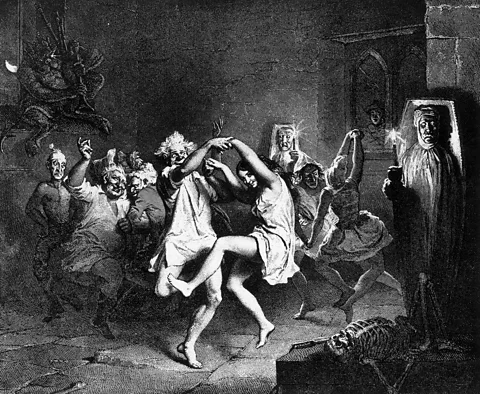
In fact, there isn’t much that Burns doesn’t do in Tam O’Shanter – and he does it all in rhyming iambic tetrameter. “He’s showing off,” says Irvine. “He’s doing one thing, and saying ‘Hey, look, I can do this other thing as well.’ In his first volume of poems, he does that between one poem and the next. He adopts different verse genres, he switches from Scots to English, he borrows from all sorts of different traditions – both what we think of now as the folk tradition, and the literary traditions of England and Scotland. It’s a virtuoso display of all the different things that he can do. And in Tam O’Shanter, he’s doing all that within one poem.”
Appropriately for a Burns Supper centrepiece, Tam O’Shanter is a feast, its most satisfying ingredient being its fond and insightful portrait of a character described as “the universal everyman” by Prof Gerard Carruthers, the editor of The Oxford Handbook of Robert Burns. Burns is admired for his egalitarian politics, and even in his rollicking horror comedy, his sympathy for the common man shines through. “Tam O’Shanter is a poem of misdirection,” Carruthers tells the BBC. “Burns is saying: ‘Look at this! Look at the witch! Look at the horse!’ Whereas in fact the real thing that he is talking about is the way in which we’re incorrigible as human beings.” The poem glows with “ridicule and affection at the same time for Tam, and by extension for the human psyche in general”.
It’s a poem about humanity – the pleasures and the appetites, the challenges and the frailties – Gerard Carruthers
Burns – a notorious womaniser – is especially sharp on masculine foibles. “Burns knows the male mind,” says Carruthers. “He knows that men in a lot of ways are stupid wee boys.” On the other hand, says Mackay, women may recognise themselves in Tam O’Shanter, too. “It’s a poem about humanity – the pleasures and the appetites, the challenges and the frailties – and I think that’s one of the reasons why Burns is so universally popular. He talks about what it is to be a human being – and everything that we see in different places throughout his poetic oeuvre is somehow represented in this one poem.”
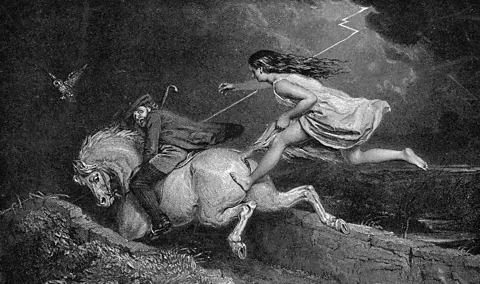
Still, alongside its compassion, there is devilry of more than one kind in Tam O’Shanter. “The weird and disturbing thing about this poem is that Burns’s father, William Burnes, was a very pious and serious man who despaired of the libertine tendencies of his son,” says Irvine. “He organised repairs to Alloway Kirk when Burns and his brother were boys, and one of the reasons for that is that he wanted to be buried there – and he was. So, in 1784 Burns’s father was buried in Alloway churchyard, which Burns then makes famous as the site of a witches’ orgy. Was he getting revenge on his father for his disapproval of his eldest son?”
As well as everything else Burns is doing in Tam O’Shanter, it could be argued that he is almost literally dancing on his father’s grave. Anyone who hears it at a Burns Supper on Sunday will have plenty to chew on.
—
If you liked this story, sign up for The Essential List newsletter – a handpicked selection of features, videos and can’t-miss news, delivered to your inbox twice a week.
For more Culture stories from the BBC, follow us on Facebook and Instagram.
Art & Culture
Archaeological Seminar on Indus Valley Civilization of Pakistan in France

Paris ( Imran Y. CHOUDHRY):- The Embassy of Pakistan organized an event on the archeological studies of the 5000-year-old Indus Valley Civilization with Dr. Aurore Didier, Director of the French Archaeological Mission of the Indus Bassin.
Representatives of the UNESCO World Heritage Center, the Agha Khan Development Network (AKDN), archaeologists, historians and diplomats attended the event, which was organized with the support of the “Cercle des Amis du Pakistan”.
Dr. Didier briefed the audience on the history of the archeological excavations carried out by French archeologists in Pakistan. She gave an update on the latest research resulting from ten years of excavations at Chanhu-daro, one of the emblematic sites of the ancient Indus Valley Civilization. She also addressed how the adaptation of ancient populations to river and environmental fluctuations can be a key to understanding the current crises related to climate change and natural disasters that heavily impact South Asia today.
Addressing the audience, Ambassador Mumtaz Zahra Baloch noted the seventy years of cooperation between Pakistan and France in the domain of archeology. She appreciated the contributions made by the French Archeological Mission in Pakistan in research on the Indus Valley Civilization; and in promoting knowledge and competencies amongst local communities and scholars.
The Ambassador also reiterated her warm support for the “Cercle des Amis du Pakistan” for its initiatives in highlighting the cultural richness and diversity of Pakistan.
Art & Culture
From Bank Lines to Bus Seats: Bold Lessons in Courtesy, Courage, and Everyday Survival

In the line of bill payers at the bank,
As the fairer sex,
If sick, don’t just be blank
“Ladies first”, “excuse me11, “before you please.”
For deals with unpaid bills,
Ask for goods back, threat if you will,
Repeat the request for a job.
You may make it from the mob,
Instead of standing, share the seat on the bus
Isn’t it much better than making a fuss,
Whatever you do during tug-of-war, do not push the rope
Or you’ll be the laughing stock amidst cries of, “What a dope.”
-

 Europe News11 months ago
Europe News11 months agoChaos and unproven theories surround Tates’ release from Romania
-

 American News11 months ago
American News11 months agoTrump Expels Zelensky from the White House
-

 American News11 months ago
American News11 months agoTrump expands exemptions from Canada and Mexico tariffs
-

 American News11 months ago
American News11 months agoZelensky bruised but upbeat after diplomatic whirlwind
-

 Art & Culture11 months ago
Art & Culture11 months agoThe Indian film showing the bride’s ‘humiliation’ in arranged marriage
-

 Art & Culture11 months ago
Art & Culture11 months agoInternational Agriculture Exhibition held in Paris
-

 Pakistan News7 months ago
Pakistan News7 months agoComprehensive Analysis Report-The Faranian National Conference on Maritime Affairs-By Kashif Firaz Ahmed
-

 Politics11 months ago
Politics11 months agoUS cuts send South Africa’s HIV treatment ‘off a cliff’






